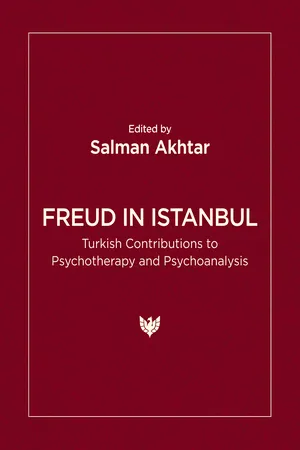
Freud in Istanbul
Turkish Contributions to Psychotherapy and Psychoanalysis
- English
- ePUB (mobile friendly)
- Available on iOS & Android
Freud in Istanbul
Turkish Contributions to Psychotherapy and Psychoanalysis
About this book
With contributions from Salman Akhtar, Müge Alkan, Gülgün Alptekin, Mine Özgüro?lu Çukurçe?me, Yavuz Erten, Cemile Serin Gürdal, Elif Nisan ?lkmen, Ülkü Elif Gur???k, Bella Habip, Cüneyt ??can, Süreyya ??can, T. Byram Karasu, M. Sa?man Kayatekin, Z. Emel Kayatekin, P?nar Limnili Özeren, Talat Parman, Kutlu?han Soyubol, I??l Vahip, Vam?k D. Volkan, and Ayla Yaz?c?.
The book is divided into four parts. The first looks at the history of psychoanalysis in Turkey. The second investigates the psychology of mothers, fathers, siblings, and the adolescent phase in Turkey. The third addresses the complexities and nuances of identity formation, nostalgic rumination, massive trauma, and female aggression in the context of Turkish society at large, including the use of film and literature. The fourth pertains to technical clinical issues, dealing with matters as diverse as grief, spirituality in the context of psychotherapy and psychoanalysis, tenacious maternal transferences and the handling of nonverbal material in the clinical session, to name but a few. While the book is psychoanalytic, not all contributors are analysts; many belong to other fields including psychology, sociology, psychiatry, and cultural anthropology. Thus, this is a book not only for psychoanalysts, but also for members of those fields, psychotherapists, and anyone with an interest in Turkish culture.
Frequently asked questions
- Essential is ideal for learners and professionals who enjoy exploring a wide range of subjects. Access the Essential Library with 800,000+ trusted titles and best-sellers across business, personal growth, and the humanities. Includes unlimited reading time and Standard Read Aloud voice.
- Complete: Perfect for advanced learners and researchers needing full, unrestricted access. Unlock 1.4M+ books across hundreds of subjects, including academic and specialized titles. The Complete Plan also includes advanced features like Premium Read Aloud and Research Assistant.
Please note we cannot support devices running on iOS 13 and Android 7 or earlier. Learn more about using the app.
Information
Table of contents
- Cover Page
- Half Title
- Full Title
- Copyright
- Dedication
- Contents
- Acknowledgments
- About the editor and contributors
- Introduction
- Part I: Historical backdrop
- Part II: Developmental observations
- Part III: Cultural studies
- Part IV: Clinical reports
- Notes
- References
- Index